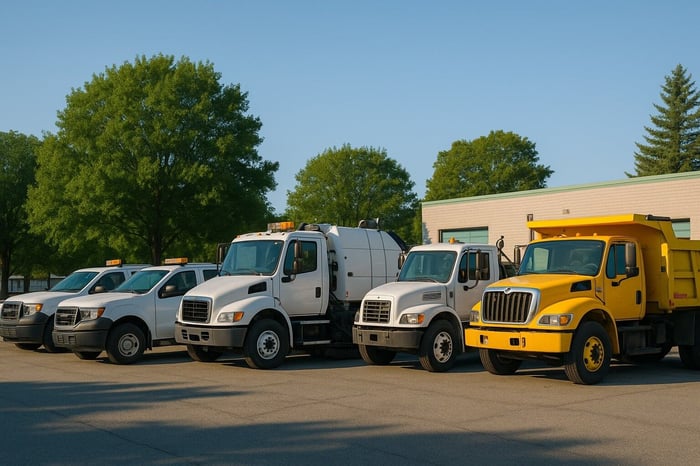When the federal government shuts down, it can feel like a faraway issue in Washington, D.C. But if you follow government auctions, surplus equipment, or municipal assets, a federal shutdown can have real effects right where you work.
On October 1, 2025, Congress missed the deadline to pass a funding bill, and the federal government officially went into shutdown mode. Agencies have furloughed workers, paused projects, and, as of early October 2025, the GSA confirmed that all property-disposal activities are paused for the duration of the shutdown.
What happens to auctions during a shutdown
Normally, agencies like the General Services Administration (GSA) handle the sale of excess federal property, which includes everything from pickup trucks and forklifts to entire buildings. But when there’s no approved budget, many of those functions grind to a halt.
According to the GSA’s contingency plan, federal property disposal isn’t considered an “essential” activity. That means:
Scheduled auctions may be postponed or canceled.
Listings that are already live could be frozen.
Title transfers and inspections often stop until funding resumes.
Essentially, if there’s no one available to process the paperwork, even listed assets can’t legally move, and it will affect reopening as well. As D.C. law firm Paul, Weiss noted, "If the shutdown extends, there may be delays in actions at many agencies even after they open due to developing backlog."
Why this matters to local governments
Federal agencies aren’t the only ones affected. Many local and state projects depend on federal funds. When those funds stop, capital projects like bridge repairs, road resurfacing, or transit upgrades can stall. That can trigger a domino effect:
Equipment tied to delayed projects sits idle.
Municipalities might move up their surplus timelines to free up cash.
Some agencies postpone new purchases until reimbursements restart.
For buyers and sellers in the surplus world, that mix of delays and uncertainty can change the market quickly.
But even while federal auctions are on pause, local governments don’t have to sit still. Municipalities can still sell their surplus vehicles and equipment right now on sites like Municibid. It’s an easy way to keep inventory moving and generate revenue even while federal sales are frozen.
Many buyers who’d normally browse GSA auctions are already shifting their attention to local surplus listings, making this a great moment for municipalities to reach a broader audience of bidders.
Local governments can keep surplus equipment moving during the federal shutdown by listing their vehicles and assets on Municibid, where buyers are still active and looking for inventory.
Lessons from the last major shutdown
This isn’t the first time we’ve seen it happen. During the 2018-19 federal government shutdown, which lasted 35 days, agencies like GSA and the Department of the Interior postponed planned auctions and froze property transfers.
The Congressional Budget Office later estimated roughly $18 billion in delayed discretionary spending during that shutdown. Once operations restarted, agencies faced major backlogs—creating a temporary rush to catch up on everything from procurement to asset disposal.
In short, things eventually returned to normal, but not right away. When the doors reopened, there was a wave of listings, compressed timelines, and more competition for the same pool of buyers.
Navigating the post-shutdown auction surge
When the federal government reopens, the return to business won’t be gradual—it’ll be a flood. Agencies like the GSA and Treasury will be working through weeks of pent-up inventory, and that means hundreds of vehicles and pieces of equipment could hit the market all at once.
For sellers and municipalities, the surge is both an opportunity and a challenge.
Once the shutdown ends, expect a flood of listings as federal agencies rush to clear their backlogs. That sudden volume can crowd the market and make it harder for individual sellers to stand out.
Cities and counties that kept their listings active on auction sites like Municibid will already be ahead of the curve. As GSA and other agencies reopen, they will be positioned to sell faster, attract more bidders, and capture attention, while others are just getting restarted.
The bottom line
A federal government shutdown may sound like a Beltway story, but for the surplus and municipal world, it’s a practical one. Fewer federal auctions mean tighter supply, slower paperwork, and sometimes higher demand for local assets.
The good news? Shutdowns end. And when they do, a lot of delayed projects and asset sales come back online at once.
Whether you’re bidding, selling, or managing a fleet, staying organized now will help you move quickly when the government (and the auction pipelines) come back to life.
When federal auctions restart, make sure your listings are already in front of bidders. Sell your surplus on Municibid and stay ahead of the post-shutdown rush.
FAQ: Government Shutdowns and Public-Asset Auctions
1. Do GSA auctions stop when the government shuts down?
Yes. During a federal shutdown, the General Services Administration (GSA) pauses all property disposal and auction activity. Listings may remain online, but title transfers, inspections, and final sales can’t be processed until funding is restored.
2. How long do auction delays usually last?
Delays last as long as the shutdown. Once funding resumes, it can take a few weeks for agencies to clear backlogs and restart normal operations. Expect a short “catch-up” period when many auctions relaunch at once.
3. Can local governments still hold surplus auctions during a federal shutdown?
Yes. Municipal and state surplus programs operate independently of federal funding. In fact, local auctions may attract more bidders when federal listings are paused.
4. Will equipment prices drop or rise during a shutdown?
It depends on supply and demand. With fewer federal auctions happening, buyers often shift their focus to local or regional sales, sometimes driving prices up for in-demand items like vehicles and heavy equipment.
5. What should buyers and sellers do during a shutdown?
Buyers should monitor listings closely and build extra time into delivery expectations. Sellers, especially municipalities, can use this pause to organize inventory, clean up documentation, and prepare listings for when activity resumes.






